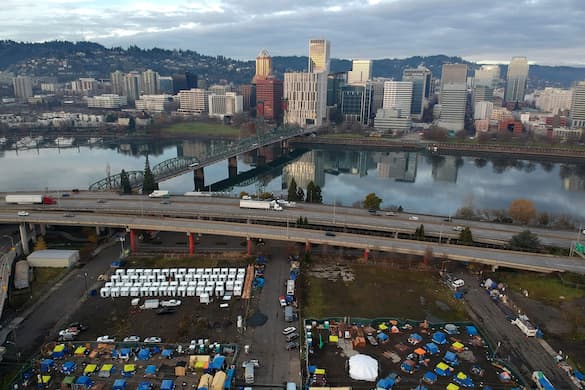Supreme Court To Rule on Whether Arresting Homeless People for Sleeping in Public Is ‘Cruel and Unusual’ Punishment
The high court announced Friday it will finally weigh in on the issue.

For five years, the Eighth Amendment’s “cruel and unusual” punishment clause has been cited by courts to ban cities from arresting homeless people sleeping on public land if there aren’t enough shelter beds.
That could change, as the Supreme Court said Friday it will consider a case that Western politicians say is tying their hands on clearing homeless encampments. The decision is expected to have ripple effects for the nation’s estimated 653,100 homeless people — a record-high number and a 70,000-person increase since 2022.
Friday’s announcement follows a months-long effort by a rare, bipartisan coalition of leftist politicians and free-market groups that have been asking the high court to weigh in. The groups, as the Sun has reported, are supporting a small Oregon city, Grants Pass, which is trying to enforce its public camping ordinances after the Ninth Circuit Court of Appeals ruled in Johnson v. City of Grants Pass, building on a 2018 case, Martin v. Boise, that if there aren’t enough shelter beds, being homeless is “involuntary.”
The Supreme Court declined to weigh in on the topic in 2019.
“What’s changed, I think, is the severity of the problem that we’re seeing in many states, particularly in the Ninth Circuit,” the Goldwater Institute’s legal affairs vice president, Timothy Sandefur, tells the Sun.
The Goldwater Institute, one of the groups that filed an amicus brief on the topic, is located at Phoenix, where a judge ordered the city to clear a large homeless encampment known as “The Zone” last year, a ruling in which he specifically asked the Supreme Court to weigh in on the Grants Pass and Martin rulings.
While the appellate rulings technically applied only to the Ninth Circuit, which covers the West Coast of America where the homeless crisis is acute, Mr. Sandefur said, “everybody knows that the circuits all kind of listen to each other and that if you’re living in Florida, you can’t just ignore what the Ninth Circuit Court of Appeals says,” because all it takes is one judge being persuaded by it.
In western cities, including Phoenix, last year, city leaders used the appellate rulings as “excuses to rationalize their doing nothing” to address homeless encampments.
“The best we can hope for here is that the Supreme Court will take away an excuse from cities to refuse to act,” he said, adding that it won’t force cities to act. “This case is not a panacea that will solve the problem, it just takes away one of the obstacles to solving the problem.”
The Supreme Court’s decision comes one day after the Ninth Circuit doubled down on its previous rulings on the Eighth Amendment issue. In Coalition on Homelessness v. San Francisco, the court left an injunction in place against the city to prevent it from clearing homeless encampments.
The dissent, authored by a circuit judge, Patrick Bumatay, called the ruling itself cruel and unusual.
“Our decision is cruel because it leaves the citizens of San Francisco powerless to enforce their own health and safety laws without the permission of a federal judge,” he wrote. “And it’s unusual because no other court in the country has interpreted the Constitution in this way.”
He said the court, based on a “misreading” of the Eighth Amendment, is dictating to San Francisco how it manages its own streets.
“The result of the district court’s far-reaching injunction is that homeless persons now have a choice to sleep, lie, or sit anywhere they want in public at any time until San Francisco can provide them shelter,” he wrote. “That ruling is far removed from the original meaning of the Cruel and Unusual Punishments Clause and disregards the long history of anti-vagrancy laws in this country.”
Governor Newsom was among the group asking the Supreme Court to consider the case, and he filed an amicus brief in September.
“California has invested billions to address homelessness, but rulings from the bench have tied the hands of state and local governments to address this issue,” he said on Friday. “The Supreme Court can now correct course and end the costly delays from lawsuits that have plagued our efforts to clear encampments and deliver services to those in need.”

